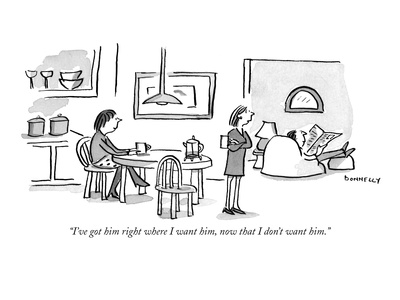When we confuse our language, and use words inappropriately, we begin to interfere with our own success. In the case of the word want, this can have horribly a damaging effect.
If my friend had truly wanted to learn to play piano, nothing would have stopped him from his daily practice, or from nagging me for lessons and help. I would not have to remind him to practice or that he needed to schedule lesson time with me; I would have had to teach him to shut him up.
And when we look at this on a broader scale, this use of the word want to mean something other that what it does, means that we go through life unfulfilled. It means that we have this wishlist of unsought dreams, never tried. And that way lies vast unhappiness. We think we want something, and we don't get it, and that makes us discontent. What most people mean by want is a wistful "wouldn't it be nice if . . ." feeling, rather than a true desire to do something.
The other meaning of the word want makes this abundantly clear. To want something also means to lack or to need something, as in "He died for want of food." That doesn't mean he died because he would like to have food, but he died because he lacked food. Want, in its other sense, is the need to fill that lack.







 My Experience with KaiZenon 04/19/2016
My Experience with KaiZenon 04/19/2016
 How to Use Your Car Cigarette Lighter: Fun, Ridiculous and Useful Aftermarket 12-volt Accessorieson 10/03/2015
How to Use Your Car Cigarette Lighter: Fun, Ridiculous and Useful Aftermarket 12-volt Accessorieson 10/03/2015
 Why Use NextDoor?on 07/13/2015
Why Use NextDoor?on 07/13/2015
 Food Network Toaster Reviewon 06/12/2015
Food Network Toaster Reviewon 06/12/2015




Comments
I see what you're saying, about the mot juste and a "system of priorities in their language" (loved that). Unfortunately a lot of people just don't pay that much attention to language. I'm often amazed how easy it is to learn a language from certain movies: people talk in prefabricated strings of words. And they just don't take those words apart. Anyway, I really enjoyed your article. Welcome to Wizzley!
Thank you, Abby. My view is that if they don't want the hard work, it's more of an idle fancy than an actual want.
And thank you, Mira. And yes, I often am frustrated because there are not enough hours in the day for all the things I want to achieve. My issue is with language. If you're not taking action towards what you say you want, then you need to choose a different word, because people end up unhappy. They have no way to distinguish between wants, idle fancies, etc., and then because they don't have a system of priorities in their language, they end up unhappy, dissatisfied with themselves, and usually regretting that they didn't follow through. This article is intended as a tool for them to learn to distinguish what they actually want, and help them follow through, and to dismiss the rest.
I love that title, "You Don't Want to Admit It." There is also another thing about wants that my father always reminds me of (and I don't always appreciate it). Some people want more than they can achieve. Meaning they really want the thing, but they are just not capable of reaching that goal. So that's another element to the discussion, I think.
I've always thought that if I aim for 10 things and achieve 7, that's a better deal than aiming for 5 things. Now, you may not be that good at all 7, but if you're happier -- and I am -- than that's fine. Of course, sometimes it can be quite a struggle to juggle 10 plates.
This was very interesting. I often tell people, if you really want something, you'll find a way to make it happen. I think some people want things, just not the hard work that comes with obtaining it.